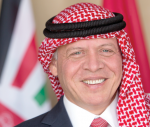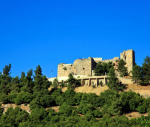You are here
Defying allies, Qatar unlikely to abandon favoured Syria rebels
By Reuters - Mar 20,2014 - Last updated at Mar 20,2014
DOHA — Qatar’s backing for Syrian rebels widely regarded as jihadi militants might appear a diplomatic liability at a time when global alarm about Al Qaeda is on the rebound.
But that is not the way things are viewed in the Gulf Arab state, which is proud of its self-declared campaign to back the Arab Spring revolts against autocratic rule that began in 2011.
The tiny but wealthy gas exporting country is under fierce pressure from some Gulf Arab neighbours to curb its support for Islamists of all stripes, principally the Muslim Brotherhood in Egypt and more radical rebel groups with Al Qaeda ties in Syria.
The two most powerful Arab Gulf states, Saudi Arabia and the United Arab Emirates are incensed by Qatar’s hosting of preacher Youssef Al Qaradawi.
Riyadh and Abu Dhabi see the pro-Brotherhood Qaradawi as a potent political menace.
They are also furious about Qatar’s use of its Al Jazeera broadcaster and Qatari television to promote Brotherhood views critical of other Gulf Arab states, and Al Jazeera’s airtime for groups with Al Qaeda ties in Syria.
At a time when Sunni militants are resurgent in the Middle East and North Africa, and thousands of foreigners are fighting with Al Qaeda aligned groups in Syria, many Gulf Arab officials perceive Qatar’s continued support of Islamists as reckless.
But Qatar, a US ally, is signalling defiance.
“The independence of Qatar’s foreign policy is simply non-negotiable,” Foreign Minister Khaled Al Attiyah said in a speech in Paris this month
“Qatar is to take decisions, and follow a path, of its own.”
In the case of Syria, diplomats and sources close to the government say it is unlikely to abandon groups that are among the toughest in fighting President Bashar Assad’s forces, no matter the flak its policy takes from both allies and enemies.
Qatar’s Syria policy matters not only because Doha remains a generous backer of the opposition but also because its dispute with other funders — notably Riyadh and Western states — about who to back do little to heal months of violent rebel rifts.
The infighting has undermined the rebels’ three-year-old fight against Assad and the prominence of hardline jihadi groups has made Western governments hesitant to back the rebellion.
But Doha sees its friends in Syria as freedom fighters, not militants. Its official line is that Qatar supports only the moderate armed groups backed also by Saudi Arabia and the West.
‘Playing with fire’
Qatar also rejects any suggestion it provides help to Al Qaeda, seen in Washington as a diminished but still deadly foe.
And yet fighters inside Syria, and diplomats and analysts in the region say Doha also provides help to groups that have coordinated tactically on the ground with Al Qaeda affiliates and which share their ambition to create a strict Islamic state.
An Arab diplomatic source said Qatar knew it was “playing with fire, but this is what Qatar does: They gain the confidence of powerful extremist groups which they believe gives them a diplomatic edge over any other country.”
A Gulf-based diplomat said Qatar was still backing Islamist groups in Syria, sending them financial aid and light weapons.
“Let’s face it, the Islamist groups are the strongest on the ground in Syria right now, and Qatar believes that after Assad they’ll rise to power,” the diplomat added.
An example is Ahrar Al Sham, which adheres to Islam’s ultraconservative Salafi tradition, has thousands of fighters and is part of the Islamic Front, an amalgam of six Islamist groups.
The front was formed last November as a counter to the US-backed Supreme Military Council rebel leadership, depriving it of some of its main members. An Arab diplomat said the Front was created by Qatar and Turkey to try to check an increase in Saudi influence with the rebels detected in 2013.
Rebel rifts
“Qatar backs the Islamic Front and Ahrar Al Sham is part of it, it is an important part of the Islamic Front so why would Qatar stop backing it?” an Islamic Front commander told Reuters by telephone on Tuesday from inside Syria.
Diplomats say Saudi Arabia backs nationalist and Islamist groups that have no links to Al Qaeda.
With Saudi Arabia stepping up efforts to protect itself from jihadi influence at home and openly confronting Qatar’s policies, rebel rifts may now worsen.
Saudi Arabia, the United Arab Emirates and Bahrain recalled their ambassadors from Doha saying Qatar had interfered in their affairs, a reference to its support of Islamist groups opposed to them.
On the ground, the cleavage is visible.
“Nothing has changed in Qatar’s support for the Islamic Front with all its factions, including Ahrar Al Sham and Islam Army,” the Islamic Front commander said.
Another Islamic Front commander told Reuters that Qatari financial backing continued, but at a lower level compared to four months ago. He said he did not know why.
Volatile situation
Admirers of Qatari policy say there is nothing sinister about backing groups like Ahrar Al Sham.
They note members of the Islamic Front including Ahrar Al Sham have fought the Islamic State in Iraq and the Levant, an Al Qaeda splinter group that is the most hardline of all the Islamist forces in Syria. They say the group is fighting to replace Assad with Islamic rule rather than seeking to participate in a transnational jihad against the West.
Qatar’s ties to Islamists are also a source of US unease.
Washington is a friend: Qatar plays host to the most important military base in the region, has close US commercial ties and for years has worked with Washington in mediating conflicts around the region.
But US Treasury Under Secretary for Terrorism and Financial Intelligence David Cohen, in a speech in Washington on March 4, cited press reports that the Qatari government is “supporting extremist groups operating in Syria”
“To say the least, this threatens to aggravate an already volatile situation in a particularly dangerous and unwelcome manner,” he said.
Related Articles
BEIRUT — A diplomatic crisis pitting Saudi Arabia against Qatar has put Syrian rebels in a difficult position, analysts say, after riv
At a desert base, Gulf state Qatar is covertly training moderate Syrian rebels with US help to fight both President Bashar Assad and Islamic State (IS) and may include more overtly Islamist insurgent groups, sources close to the matter say.
DUBAI — Qatar said on Thursday it had placed 28 people and entities on a terrorism list, including several Qatari nationals already blacklis

















